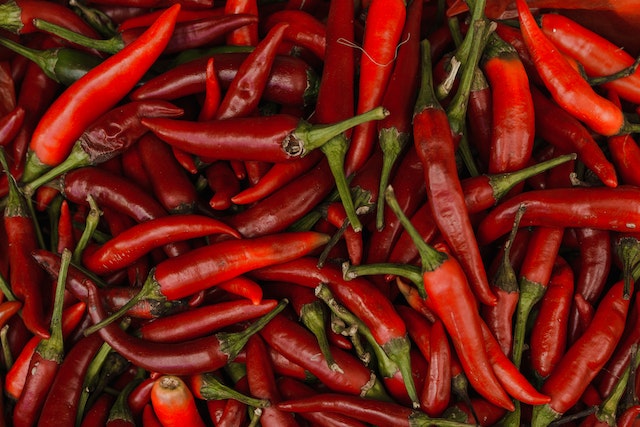Botanical Description:
Scientific Name: Capsicum annuum or Capsicum frutescens
Family: Solanaceae
Common Names: Cayenne pepper, Red Pepper
Description: Cayenne is a perennial shrub native to Central and South America but is now cultivated worldwide. It belongs to the Solanaceae family, which also includes tomatoes and potatoes. The plant produces small, elongated fruits that are usually red when mature. These fruits are dried and ground to make cayenne pepper. The active compound responsible for the pungency and therapeutic properties is capsaicin. Cayenne has a long history of use in traditional medicine, and its heat-inducing properties contribute to its therapeutic effects.
Disclaimer:
This Materia Medica is provided for informational purposes only and should not replace professional medical advice. Please consult with a qualified healthcare practitioner or herbalist before using any herbal remedies.
Therapeutic Actions:
- Circulatory Stimulant: Cayenne is a powerful circulatory stimulant, promoting blood circulation throughout the body.
- Digestive Aid: It stimulates digestive juices and aids in digestion.
- Topical Analgesic: Cayenne’s active compound, capsaicin, has topical analgesic properties, providing relief for certain types of pain.
- Anti-Inflammatory: Cayenne may have anti-inflammatory effects, especially when used topically.
- Detoxifying Agent: It is believed to support detoxification processes in the body.
Constituents:
- Capsaicinoids: The active compounds responsible for the heat and therapeutic effects of cayenne, including capsaicin.
- Vitamins and Minerals: Cayenne contains vitamins A and C, as well as minerals like potassium.
- Flavonoids: Flavonoids with antioxidant properties are present in cayenne.
- Carotenoids: Carotenoids contribute to the red color of cayenne and have antioxidant effects.
Traditional Uses:
- Circulatory Support: Cayenne is traditionally used to improve circulation and support cardiovascular health.
- Digestive Health: It is employed as a digestive aid, stimulating digestive juices and enhancing digestion.
- Pain Relief: Cayenne’s topical use is traditional for pain relief, especially for conditions like arthritis or muscle pain.
- Weight Management: Some traditional uses suggest that cayenne may support weight management by increasing metabolism.
- Detoxification: Cayenne is believed to have detoxifying effects, supporting the elimination of waste from the body.
Dosage and Preparation:
- Infusion: Make an infusion by steeping 1/4 to 1/2 teaspoon of cayenne powder in a cup of hot water. Drink once daily.
- Tincture: Cayenne tinctures are available. Follow product recommendations or herbalist advice for dosage.
- Capsules: Capsules containing cayenne powder are available. Follow product recommendations for dosage.
- Topical Ointments: Cayenne ointments or creams, containing capsaicin, can be applied topically for pain relief. Follow product recommendations.
Cautions and Considerations:
- Digestive Sensitivity: Individuals with digestive sensitivities may experience discomfort with cayenne. Start with small amounts.
- Topical Use Caution: Cayenne ointments containing capsaicin can cause a burning sensation. Avoid contact with sensitive areas and wash hands thoroughly after application.
- Pregnancy and Lactation: Pregnant and lactating individuals should consult with a healthcare practitioner before using cayenne supplements.
- Drug Interactions: Cayenne may interact with certain medications. Consult with a healthcare provider if taking medications.
Conclusion:
Cayenne, with its fiery heat and therapeutic properties, has earned a significant place in traditional medicine. From supporting circulation and digestion to providing relief for certain types of pain, cayenne’s versatility is evident. However, caution is advised, especially for individuals with digestive sensitivities and when using topical formulations with capsaicin. As with any herbal remedy, consulting with a qualified healthcare practitioner or herbalist ensures that cayenne is used appropriately and safely. Integrating cayenne into health and wellness practices can be beneficial when done with knowledge and consideration for individual health conditions.






